雅思大作文范文:旅游业文化保护
观点类雅思作文
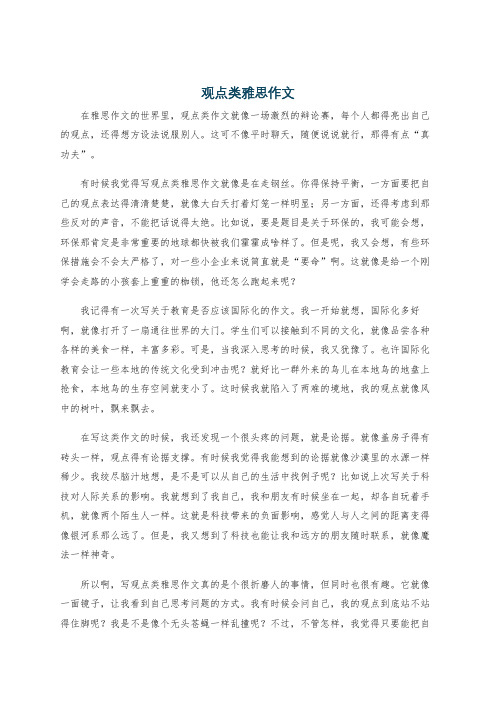
观点类雅思作文在雅思作文的世界里,观点类作文就像一场激烈的辩论赛,每个人都得亮出自己的观点,还得想方设法说服别人。
这可不像平时聊天,随便说说就行,那得有点“真功夫”。
有时候我觉得写观点类雅思作文就像是在走钢丝。
你得保持平衡,一方面要把自己的观点表达得清清楚楚,就像大白天打着灯笼一样明显;另一方面,还得考虑到那些反对的声音,不能把话说得太绝。
比如说,要是题目是关于环保的,我可能会想,环保那肯定是非常重要的地球都快被我们霍霍成啥样了。
但是呢,我又会想,有些环保措施会不会太严格了,对一些小企业来说简直就是“要命”啊。
这就像是给一个刚学会走路的小孩套上重重的枷锁,他还怎么跑起来呢?我记得有一次写关于教育是否应该国际化的作文。
我一开始就想,国际化多好啊,就像打开了一扇通往世界的大门。
学生们可以接触到不同的文化,就像品尝各种各样的美食一样,丰富多彩。
可是,当我深入思考的时候,我又犹豫了。
也许国际化教育会让一些本地的传统文化受到冲击呢?就好比一群外来的鸟儿在本地鸟的地盘上抢食,本地鸟的生存空间就变小了。
这时候我就陷入了两难的境地,我的观点就像风中的树叶,飘来飘去。
在写这类作文的时候,我还发现一个很头疼的问题,就是论据。
就像盖房子得有砖头一样,观点得有论据支撑。
有时候我觉得我能想到的论据就像沙漠里的水源一样稀少。
我绞尽脑汁地想,是不是可以从自己的生活中找例子呢?比如说上次写关于科技对人际关系的影响。
我就想到了我自己,我和朋友有时候坐在一起,却各自玩着手机,就像两个陌生人一样。
这就是科技带来的负面影响,感觉人与人之间的距离变得像银河系那么远了。
但是,我又想到了科技也能让我和远方的朋友随时联系,就像魔法一样神奇。
所以啊,写观点类雅思作文真的是个很折磨人的事情,但同时也很有趣。
它就像一面镜子,让我看到自己思考问题的方式。
我有时候会问自己,我的观点到底站不站得住脚呢?我是不是像个无头苍蝇一样乱撞呢?不过,不管怎样,我觉得只要能把自己真实的想法表达出来,哪怕有点混乱,也算是完成了任务吧。
旅游环保作文雅思

旅游环保作文雅思一、“sustainable(可持续的)”- 单词释义:能够持续存在、发展的,在不损害未来资源的前提下满足当前需求的。
- 单词用法:可以用作形容词,例如“sustainable development(可持续发展)”,“a sustainable tourism model(一种可持续的旅游模式)”。
- 近义词:endurable(可忍受的;能持久的)。
- 短语搭配:sustainable growth(可持续增长),sustainable environment (可持续环境)。
- 双语例句- “We should pursue a sustainable way of traveling. Just think about it, if we keep on using resources recklessly during our trips, what will be left for our children? It's like eating all the candies in the jar today and leaving none for tomorrow.”(我们应该追求一种可持续的旅行方式。
想想看,如果我们在旅行中继续肆意使用资源,那我们的孩子还能剩下什么呢?这就好比今天把罐子里所有的糖果都吃光,明天就一颗都没有了。
)- “A sustainable tourism industry is crucial. When I visited that small island, I saw how they were trying to make every tourist activity sustainable. They don't want to be like those places that ruined their beauty just for a short - term gain. It makes me so happy to support such places!”(可持续的旅游业至关重要。
旅游保护文化的英语作文
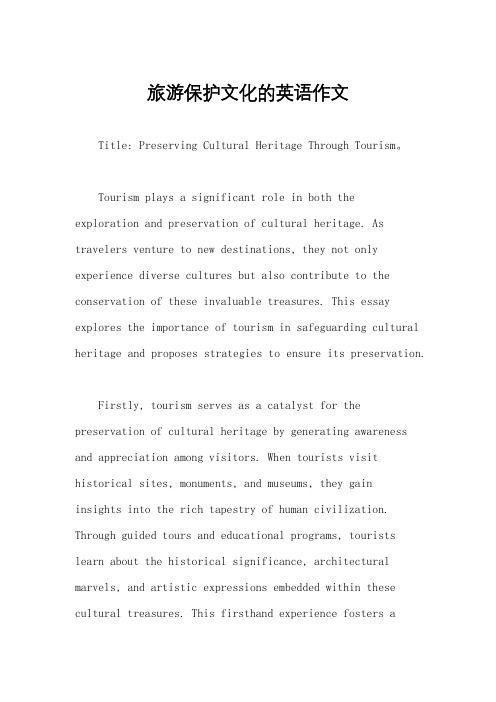
旅游保护文化的英语作文Title: Preserving Cultural Heritage Through Tourism。
Tourism plays a significant role in both theexploration and preservation of cultural heritage. As travelers venture to new destinations, they not only experience diverse cultures but also contribute to the conservation of these invaluable treasures. This essay explores the importance of tourism in safeguarding cultural heritage and proposes strategies to ensure its preservation.Firstly, tourism serves as a catalyst for the preservation of cultural heritage by generating awareness and appreciation among visitors. When tourists visit historical sites, monuments, and museums, they gaininsights into the rich tapestry of human civilization. Through guided tours and educational programs, touristslearn about the historical significance, architectural marvels, and artistic expressions embedded within these cultural treasures. This firsthand experience fosters asense of admiration and respect, compelling visitors to become advocates for their preservation.Moreover, tourism generates revenue that can be reinvested into the conservation and maintenance ofcultural heritage sites. Entrance fees, souvenir sales, and taxes levied on tourism-related activities contribute to funding restoration projects, archaeological excavations, and museum upkeep. By monetizing cultural attractions, governments and local communities can allocate resources to ensure their sustainable management and protection for future generations.Furthermore, tourism encourages community involvement and fosters cultural pride, which are essential elements in safeguarding heritage sites. Local residents often play pivotal roles as guides, artisans, and storytellers, sharing their knowledge and traditions with visitors. This engagement not only preserves indigenous practices but also strengthens social cohesion within communities. When residents recognize the economic and social benefits derived from tourism, they become stewards of theircultural heritage, actively participating in its conservation efforts.Despite its positive impact, tourism also poses challenges to the preservation of cultural heritage. Mass tourism can lead to overcrowding, degradation of infrastructure, and environmental damage in sensitive areas. Uncontrolled development to cater to tourists' demands may compromise the authenticity and integrity of heritage sites. Additionally, commercialization and commodification of culture can dilute its essence, turning sacred sites into mere tourist attractions devoid of their spiritual significance.To address these challenges, a balanced approach to tourism management is imperative. Sustainable tourism practices, such as carrying capacity limits, zoning regulations, and eco-friendly initiatives, can mitigate the negative impacts on cultural heritage sites. Cultural sensitivity training for tour guides and visitors fosters respect for local customs and traditions, fostering responsible tourism behavior. Furthermore, community-basedtourism initiatives empower local residents to actively participate in decision-making processes, ensuring that tourism benefits are equitably distributed and reinvestedin heritage preservation.In conclusion, tourism plays a pivotal role in the preservation of cultural heritage by raising awareness, generating revenue, and fostering community involvement. However, sustainable management practices are essential to mitigate the negative impacts of tourism on heritage sites. By embracing a holistic approach that balances conservation efforts with economic development and cultural sensitivity, we can safeguard our cultural treasures for future generations to cherish and celebrate.。
雅思大作文关于文化旅游

雅思大作文关于文化旅游雅思写作中有关于旅游文化这一方面,一直都是一个热门话题,怎么写好这类话题的作文,让文章出彩?雅思大作文关于文化旅游,我们一起来研究研究吧!先看一个雅思写作题目:Some people believe that culture will be ruined if it is used to earn tourism revenue, but others consider that tourism is the only way of protecting a culture. Discuss both sides and give your own opinion.范文:There is little room for doubt that tourism is one of the fastest-growing industries in the world. However, its impact on culture remains a source of constant debate. This essay will elaborate on both positive and negative effects of tourism from a cultural perspective.Providing economic incentives for cultural preservation is unarguably one of the main contributions of tourism. To many tourists, culture and history are what they first consider when choosing a destination. Their mindset has been recognised by many tourism sites and money has been subsequently directed toward cultural protection, including the maintenance of key historical sites. Tourism is therefore one of the primary forces contributing to the preservation of a culture.In addition to raising financing, tourism can make an indigenous culture known to the world and rally support worldwide to protect it. When a historic site or a site that shows a country's cultural heritage is made accessible to the public, visitors from all over the world will soon flock there. They will share their experience in the local culture with their friends and families once they return home, assisting this site to gain international fame. Both financial and technological support will flood in for the conservation of natural and cultural resources.On the negative side, tourism develops sometimes at the expense of part of culture. Food, festivals, costumes and other stimulating elements of a culture are highlighted to entertain tourists, constituting an insult to the locals and causing damage to the unique nature of a culture. Moreover, cultural commercialization has made the sacred elements of a culture commonplace and tourists are encouraged to attach little importance to a unique tradition, which cannot be found elsewhere.In the light of these facts, one can conclude that tourism is neither a boon nor a bane to cultural preservation. While its endeavor lo protect an indigenous culture should be recognized, it has put the integrity of a culture at risk.烤鸭们在备考的时要掌握一定的方法和技巧,同时,也要多看范文,吸收其中的好词好句,当你看多了就会潜移默化地在自己写作的时候随手拈来好词好句,这样就能更快速的提高自己的写作水平。
雅思作文-旅游业(共五篇)

雅思作文-旅游业(共五篇)第一篇:雅思作文-旅游业Topic:Many developing countries are currently expanding their tourist industries.Why is the case? Is it a positive development?Sample Answer:Currently, there is a hot discussion about the reasons why there are developing countries in growing number expanding tourist industries and whether it is a positive development or not.As far as I am concerned, I am convinced that it is a positive development.In this essay, I will make an analysis of the reasons in the following paragraphs.The first and foremost reason is that, tourism, which becomes the principal source of financial revenue in many developing countries, is financially beneficial to the economic development.For instance, China needs an increasing amount of foreign currencies for its modernization drive.Tourism is one of the most crucial channels to obtain such currencies.Furthermore, tourism facilitates the development of the catering business and transportation service as well.Additionally, tourist industries make primary contribution to the national income and tax revenue.In the second place, tourism provides local habitants in tourist attractions with more opportunities of employment, which has eliminated some social problems to some extent.In the scenic spots, it is common that even the uneducated people can make a living simply by selling souvenirs, local specialties and so on, which relieves the pressure of the local st but not least, it is true that tourism contributes a great deal to the friendship and mutual understanding between people from different countries, whichwill unquestionably enhance the future cooperation in international affairs.Tourism provides people with a good opportunity to have better understanding of the culture, history and customs in foreign countries.All in all, it is of great benefit for developing countries to promote the tourist industry, for it will play a positive role in both the economic and political development of a country.参考译文:当前,人们对发展中国家大力发展旅游业的原因以及这是否有利开展了激烈的讨论。
英语考试作文-雅思大作文写作范文——文化传统会因为旅游业而被破坏吗?

英语考试作文雅思大作文写作范文——文化传统会因为旅游业而被破坏吗?雅思大作文的写作范文通常用词准确简练,表达地道,且文章构造工整有条理非常易懂。
是烤鸭同学备考雅思大作文的必备材料。
我们特为大家总结出雅思大作文写作范文,供大家借鉴。
今天给大家介绍一篇——文化传统会因为旅游业而被破坏吗?下面就请欣赏这篇雅思大作文范文。
题目:Some people think that cultural traditions will be destroyed when they are used as money-making machines aims at tourists, other people believe that it is the only way to save such conditions in the world today. Discuss both sides and give your own opinion.文化传统会因为旅游业而被破坏吗?范文:It is undoubted that nowadays cultural tour is becoming pervading among tourists. However, whether it is a positivetrend or not remains a controversial issue. While I admit that utilizing cultural conventions to attract more tourists and make some money can to some extent prevent it from eliminating , I believe there are still better ways to protect our traditions.毫无疑问,如今文化旅游在旅游者中越来越普遍。
旅游是保护文化的唯一途径英语作文
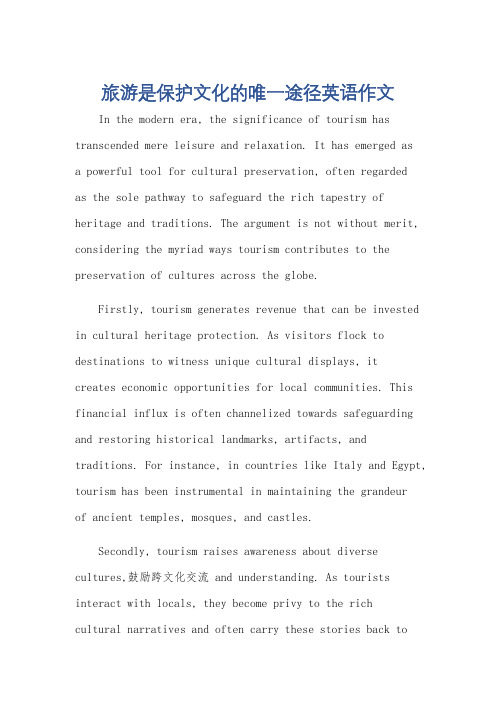
旅游是保护文化的唯一途径英语作文In the modern era, the significance of tourism has transcended mere leisure and relaxation. It has emerged asa powerful tool for cultural preservation, often regardedas the sole pathway to safeguard the rich tapestry of heritage and traditions. The argument is not without merit, considering the myriad ways tourism contributes to the preservation of cultures across the globe.Firstly, tourism generates revenue that can be invested in cultural heritage protection. As visitors flock to destinations to witness unique cultural displays, itcreates economic opportunities for local communities. This financial influx is often channelized towards safeguarding and restoring historical landmarks, artifacts, and traditions. For instance, in countries like Italy and Egypt, tourism has been instrumental in maintaining the grandeurof ancient temples, mosques, and castles.Secondly, tourism raises awareness about diverse cultures,鼓励跨文化交流 and understanding. As tourists interact with locals, they become privy to the richcultural narratives and often carry these stories back totheir homelands. This cross-cultural exchange enriches the global cultural pool and ensures that traditions and customs are not forgotten.Moreover, tourism also acts as a catalyst for the revival of dying cultural practices. In many regions, traditional crafts, dances, and music have been revived solely due to the interest generated by tourists. This renewed interest prompts locals to embrace their heritage, ensuring its survival and continuation.However, it is important to recognize that tourism alone cannot shoulder the entire burden of cultural preservation. It requires a concerted effort from governments, communities, and individuals alike. Governments need to invest in cultural heritage protection, communities must embrace their traditions, and individuals must strive to understand and appreciate diverse cultures. In conclusion, while tourism plays a pivotal role in cultural preservation, it cannot be the sole pathway. It must be complemented by other efforts to ensure thesurvival and continuation of our rich cultural heritage. By recognizing the importance of tourism while also fosteringa broader culture of preservation, we can ensure thatfuture generations will inherit a world rich in diverse cultural traditions.**旅游:文化保护的唯一途径**在现代社会,旅游的意义已经超越了休闲和放松。
旅游风景区保护环境英语作文
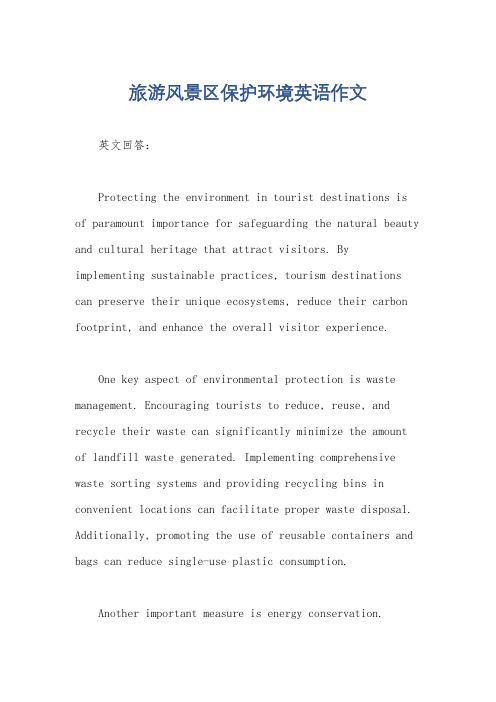
旅游风景区保护环境英语作文英文回答:Protecting the environment in tourist destinations is of paramount importance for safeguarding the natural beauty and cultural heritage that attract visitors. By implementing sustainable practices, tourism destinations can preserve their unique ecosystems, reduce their carbon footprint, and enhance the overall visitor experience.One key aspect of environmental protection is waste management. Encouraging tourists to reduce, reuse, and recycle their waste can significantly minimize the amount of landfill waste generated. Implementing comprehensive waste sorting systems and providing recycling bins in convenient locations can facilitate proper waste disposal. Additionally, promoting the use of reusable containers and bags can reduce single-use plastic consumption.Another important measure is energy conservation.Reducing energy consumption in tourist accommodations, transportation systems, and attractions can help lower carbon emissions. This can be achieved by implementing energy-efficient appliances, lighting systems, and heating and cooling systems. Promoting renewable energy sources, such as solar and wind power, can further reduce reliance on fossil fuels.Water conservation is also crucial. Encouragingtourists to practice responsible water usage in showers, toilets, and laundry can help reduce water consumption. Installing low-flow fixtures and implementing rainwater harvesting systems can further conserve water resources. Additionally, protecting water bodies from pollution by reducing fertilizer and pesticide use and promoting proper waste disposal can safeguard aquatic ecosystems.Protecting biodiversity is essential for maintaining the natural beauty and ecological balance of tourist destinations. Establishing protected areas and implementing strict regulations against poaching and illegal wildlife trade can help conserve endangered species and theirhabitats. Reducing noise and light pollution can also minimize the impact on wildlife. Additionally, promoting responsible wildlife viewing practices and educating tourists about the importance of conservation can foster a greater appreciation for the natural environment.Cultural preservation is equally important in protecting the environment in tourist destinations. Respecting local traditions and customs, preserving historical and cultural sites, and promoting sustainable tourism practices that support local communities can help maintain the unique cultural heritage that attracts visitors. Engaging local communities in tourism planning and decision-making processes can ensure that their values and traditions are respected.By implementing these measures, tourist destinations can protect their environment and ensure its long-term sustainability. This will not only enhance the visitor experience but also safeguard the natural beauty and cultural heritage that make these destinations unique.中文回答:旅游风景区环境保护。
雅思大作文范文30篇

•经济上,发展中国家的劳动力被剥削,资源被取用,而产品却不能够进人发达国家,国内产业受到外商和外企的冲击;•社会上,外国的产品流人一个国家,会改变人们的生活习惯和购买习惯;年轻人比较喜欢外同产品,比如说食品、衣服、电子产品和娱乐方式;•文化上,本土文化会被削弱,本土语言会受到威胁,文化多样性会逐步损失;•环境上,工业化生产和交通量的加大会增加温室气体的排放;游人的增多会对自然环境构成威胁。
Topic 1: Increasing travels between countries enable people to learn different cultures or to increase tension between people from different countries?外来人口的增加有利于文化的交流:•游客或者移民都具备经济利益和价值(commercial interest and economic value);而外同人的停留时间是和东道国的合作密切相关的(The length of stay depends on the cooperation of the host society.);很多当地人因此表现得非常好客和友好,这有助于文化的交流(Many local people are very friendly and hospitable, which promote the cultural communications.);•对其他的文化和人民更为了解(a better understanding of other cultures and other peoples),改变人们对其他民族和文化的态度(alter one's attitudes towards another people or culture);人们因此可以接受不同的文化和价值观(embrace different values and cultures),可以和平共处(create motivation to coexist peacefully), 并促进对"多元文化的理解(promote multi-cultural understanding);•促进文化的融合(promote integration),消除文化障碍(remove cultural barriers), 外来人口的增加导致冲突:•违反当地的习俗会激怒当地人(breach of local customs can irritate the locals);•不同文化的人看待同一事物总有不同的角度(harbour different perceptions),并给予不同的解释(different interpretations),比如对手势、衣服、言行举止有不同的理解;举止不当会引起当地人意想不到的反应(provoke unanticipated responses); •外国游客增多会对当地环境造成压力,甚至破坏环境,而移民增多可能导致工作机会减少,致使竞争更加激烈,这些都有可能引起当地人的反感(cause resentment in local communities).Globalization is a catch-all term that refers to any activity that involves more than one country, for example, travel from one country to another. The dramatic increase in transnational travel in recent years has sparked controversy over the potential impacts of this trend on individual countriesf especially those new member states of globalization. Some people are concerned that the upsurge in new arrivals will prompt local hostility against visitors instead of promoting their understanding on mutual cultural background. This notion should be rejected as one can see many facts in favor of this development between countries.The first reason why international travels would never bring conflict is rooted in the fact that both visitors and locals are economically motivated. International travel opens up opportunities for business development throughout the world. Entrepreneurs are interested not only in the domestic market but also in the oversea market. Foreigners should learn the culture of a country before winning over the local people. In turn, locals should show their hospitality to visitors in exchange for their trust. They share a view that acceptance of each other's cultural background is a necessary condition for cooperation.Understanding a culture has other implications. Differences in social background, cultural values and religious belief might make the discrepancy of foreigners and local inhabitants on some issues indelible; however, the higher interaction, the higher level of communication and understanding. Arabians, for example, used to consider westerners as their foes. Now they have concrete relations with their western allies in many fields. In the initial stage, their divergence seemedinherent but over time, with better mutual understanding, they take the same position on many issues.Undeniably, it is likely that in some resorts, foreign visitors repel the local community with their scant regard for the local environment and conventions when they first arrive. However, it should be noted that most offense is accidental, rather than intentional. Instead, visitors disobey rules and conventions simply because they have no knowledge of them. This situation is expected to be improved with the passing of time when visitors from different countries increase their knowledge of a local culture.According to the above analysis, we can observe that the increase in the international travel should not be taken as the cause of any conflict that arises between two countries. Alternatively, one should recognize its role in improving mutual understanding between two countries.1. catch-all = all-embracing:包罗甚广的;包括一切的2. hostility=enmity=resentment:敌意,怨'恨,愤恨3. rooted in=derived from=based on:基于4. entrepreneur=tycoon=mogul=industrialist:企业家,实业家5. discrepancy=disagreement=difference=divergence:分歧,矛盾6. foe=enemy=rival:敌人,竟争对手7. concrete=tangible=solid:具体的,实际的8. overtime=in due course=sooner or later:最终,早9. resort:胜地;tourist resort:旅游胜地;holiday resort:度假胜地;beach resort:海边度假胜地;scenic spot:景观;place of interest: 旅游景点10. repel=revolt=repulse:使厌恶,憎恶11. scant=limited=scarce:缺乏的,不足的Topic2: When international media (including movies, fashion shows, advertisements and other TV programs) convey the same messages to the global audience, people argue that the expansion of international media has negative impacts on cultural diversity. What is your opinion?媒体信息一致的缺点:•国际媒体(global media)—般掌握在少数几个有实力的机构手中(in the hands of a few, large, powerful organizations);有了媒体的宣传(propaganda)后,西方文化成了主流(domineering force),大规模的、有吸引力的广告(mass seductive advertising )唤起了落后地区人们对物质新的向往(create fresh desires),经济联系增强(strong economic ties),西方产品取代了本地产品,使人们更加向往西方的文化;•文化开始融合在一起(mingle),人们被新的价值观所围绕(bombarded with new values),对自己的文化失去信心和自豪感(confidence and pride),拒绝接受自己的文化传统(rejection of their cultural heritage)转而接受西方的文化习惯(adoption of Western cultural practices);西方媒体削弱了民族的特征(ethnic identity)和社会的凝聚力(social cohesion);因为担心失去观众(a loss of viewers),当地的电视台也开始播放西方的电视节目(television shows),•国际媒体的普遍会降低世界文化的品质和多样性(degrade the quality and diversity of world culture);文化被商业化(commercialized), —些文化产品(cultural goods),如音乐、服装,都变成了商品(commodities in the marketplace)。
雅思大作文专项突破:旅游业文化保护
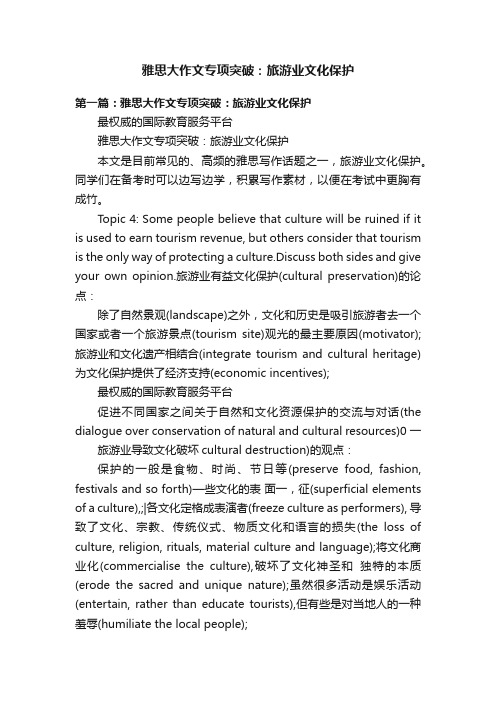
雅思大作文专项突破:旅游业文化保护第一篇:雅思大作文专项突破:旅游业文化保护最权威的国际教育服务平台雅思大作文专项突破:旅游业文化保护本文是目前常见的、高频的雅思写作话题之一,旅游业文化保护。
同学们在备考时可以边写边学,积累写作素材,以便在考试中更胸有成竹。
Topic 4: Some people believe that culture will be ruined if it is used to earn tourism revenue, but others consider that tourism is the only way of protecting a culture.Discuss both sides and give your own opinion.旅游业有益文化保护(cultural preservation)的论点:除了自然景观(landscape)之外,文化和历史是吸引旅游者去一个国家或者一个旅游景点(tourism site)观光的最主要原因(motivator);旅游业和文化遗产相结合(integrate tourism and cultural heritage)为文化保护提供了经济支持(economic incentives);最权威的国际教育服务平台促进不同国家之间关于自然和文化资源保护的交流与对话(the dialogue over conservation of natural and cultural resources)0 一旅游业导致文化破坏cultural destruction)的观点:保护的一般是食物、时尚、节日等(preserve food, fashion, festivals and so forth)—些文化的表面一,征(superficial elements of a culture),;|各文化定格成表演者(freeze culture as performers), 导致了文化、宗教、传统仪式、物质文化和语言的损失(the loss of culture, religion, rituals, material culture and language);将文化商业化(commercialise the culture),破坏了文化神圣和独特的本质(erode the sacred and unique nature);虽然很多活动是娱乐活动(entertain, rather than educate tourists),但有些是对当地人的一种羞辱(humiliate the local people);垃圾、涂鸦、破坏和噪音不断增加(increasing litter, graffiti, vandalism and noise),游客在没有被允许的情况下进人建筑物、神殿、神圣的土地(enter buildings, shrines or sacred lands without permission).这都与当地文化相冲突,是一种文化侮辱(an insult to the local culture)范文There is little room for doubt that tourism is one of the fastest-growing industries in the world.However, its impact on culture最权威的国际教育服务平台remains a source of constant debate.This essay will elaborate on both positive and negative effects of tourism from a cultural perspective.Providing economic incentives for cultural preservation is unarguably one of the main contributions of tourism.To many tourists, culture and history are what they first consider when choosing a destination.Their mindset has been recognised by many tourism sites and money has been subsequently directed toward cultural protection, including the maintenance of key historical sites.Tourism is therefore one of the primary forces contributing to the preservation of a culture.In addition to raising financing, tourism can make an indigenous culture known to the world and rally support worldwide to protect it.When a historic site or a site that shows a country's cultural heritage is made accessible to the public, visitors from all over the world will soon flock there.They will share their experience in the local culture with their friends and families once they return home, assisting this site to gain international fame.Both financial and technological support will flood in for the conservation of natural and cultural resources.On the negative side, tourism develops sometimes at the expense ofpart of culture.Food, festivals, costumes and other stimulating elements of a culture are highlighted to entertain tourists, constituting an insult to最权威的国际教育服务平台the locals and causing damage to the unique nature of a culture.Moreover, cultural commercialization has made the sacred elements of a culture commonplace and tourists are encouraged to attach little importance to a unique tradition, which cannot be found elsewhere.In the light of these facts, one can conclude that tourism is neither a boon nor a bane to cultural preservation.While its endeavour lo protect an indigenous culture should be recognized, it has put the integrity of a culture at risk.近义词表1.unarguably= unquestionably =indisputably=undeniably:无可置提地,无可否认地2.destination=site=place:地点3.maintenance=preservation=upholding=protection:保护,保存4.indigenous=original=aboriginal:本土的,原始的5.fame=reputation=recognition=eminence:名气,名声6.at the expense of=at the cost of:以牺牲…为前提7.entertain=amuse=keep somebody amused:使愉快最权威的国际教育服务平台8.insult=offence:侮辱monplace=ordinary: 平凡的10.in the light of=in view of=considering=taking into account:考虑到11.endeavour=effort=attempt:努力,尝试12.integrity=entirety=unity:完整性13.put at risk=endanger=jeopardise:危及,使…危险第二篇:雅思大作文:旅游业文化保护最权威的国际教育服务平台雅思大作文范文:旅游业文化保护本文是雅思大作文范文《旅游业文化保护》,供大家阅读参考。
文化旅游英文作文范文
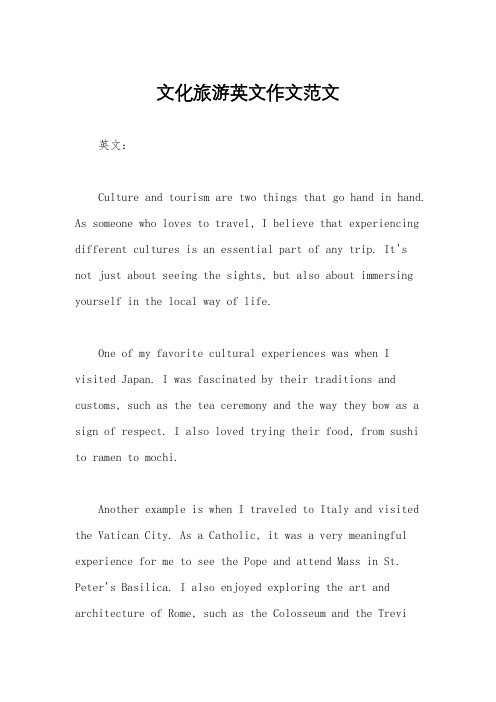
文化旅游英文作文范文英文:Culture and tourism are two things that go hand in hand. As someone who loves to travel, I believe that experiencing different cultures is an essential part of any trip. It's not just about seeing the sights, but also about immersing yourself in the local way of life.One of my favorite cultural experiences was when I visited Japan. I was fascinated by their traditions and customs, such as the tea ceremony and the way they bow as a sign of respect. I also loved trying their food, from sushi to ramen to mochi.Another example is when I traveled to Italy and visited the Vatican City. As a Catholic, it was a very meaningful experience for me to see the Pope and attend Mass in St. Peter's Basilica. I also enjoyed exploring the art and architecture of Rome, such as the Colosseum and the TreviFountain.Culture and tourism also have a positive impact on the local economy. By supporting local businesses and attractions, we help to preserve and promote their unique culture. For example, I always try to buy souvenirs from local artisans and eat at family-owned restaurants.中文:文化和旅游是密不可分的。
雅思写作大作文高分范文:文化传统会因为旅游业被破坏吗
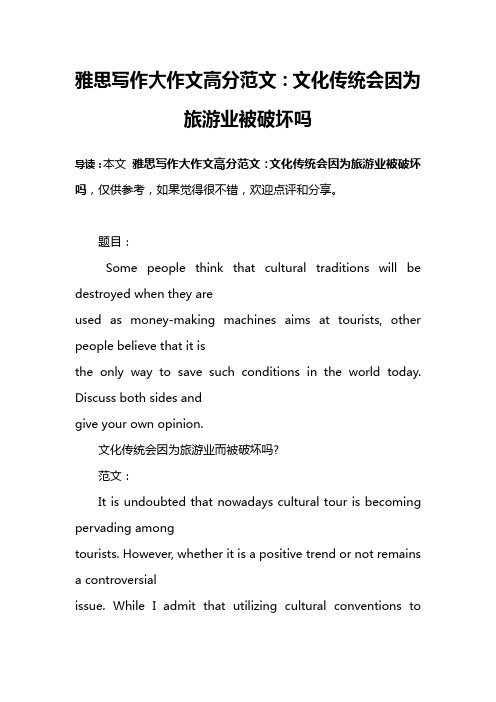
雅思写作大作文高分范文:文化传统会因为旅游业被破坏吗导读:本文雅思写作大作文高分范文:文化传统会因为旅游业被破坏吗,仅供参考,如果觉得很不错,欢迎点评和分享。
题目:Some people think that cultural traditions will be destroyed when they areused as money-making machines aims at tourists, other people believe that it isthe only way to save such conditions in the world today. Discuss both sides andgive your own opinion.文化传统会因为旅游业而被破坏吗?范文:It is undoubted that nowadays cultural tour is becoming pervading amongtourists. However, whether it is a positive trend or not remains a controversialissue. While I admit that utilizing cultural conventions toattract moretourists and make some money can to some extent prevent it from eliminating , Ibelieve there are still better ways to protect our traditions.毫无疑问,如今文化旅游在旅游者中越来越普遍。
然而,这是否是一个积极的趋势仍然是一个有争议的问题。
虽然我承认利用文化习俗来吸引更多的游客并赚些钱在某种程度上可以防止它的消失,但我相信仍然有更好的方法来保护我们的传统。
雅思写作旅游类范文
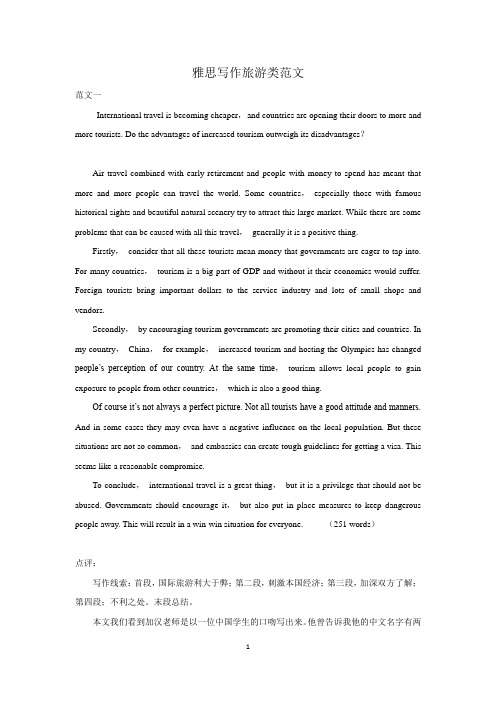
雅思写作旅游类范文范文一International travel is becoming cheaper,and countries are opening their doors to more and more tourists. Do the advantages of increased tourism outweigh its disadvantages?Air travel combined with early retirement and people with money to spend has meant that more and more people can travel the world. Some countries,especially those with famous historical sights and beautiful natural scenery try to attract this large market. While there are some problems that can be caused with all this travel,generally it is a positive thing.Firstly,consider that all these tourists mean money that governments are eager to tap into. For many countries,tourism is a big part of GDP and without it their economies would suffer. Foreign tourists bring important dollars to the service industry and lots of small shops and vendors.Secondly,by encouraging tourism governments are promoting their cities and countries. In my country,China,for example,increased tourism and hosting the Olympics has changed people’s perception of our country. At the same time,tourism allows local people to gain exposure to people from other countries,which is also a good thing.Of course it’s not always a perfect picture. Not all tourists have a good attitude and manners. And in some cases they may even have a negative influence on the local population. But these situations are not so common,and embassies can create tough guidelines for getting a visa. This seems like a reasonable compromise.To conclude,international travel is a great thing,but it is a privilege that should not be abused. Governments should encourage it,but also put in place measures to keep dangerous people away. This will result in a win-win situation for everyone. (251 words)点评:写作线索:首段,国际旅游利大于弊;第二段,刺激本国经济;第三段,加深双方了解;第四段;不利之处。
2024年雅思作文真题及高分范文
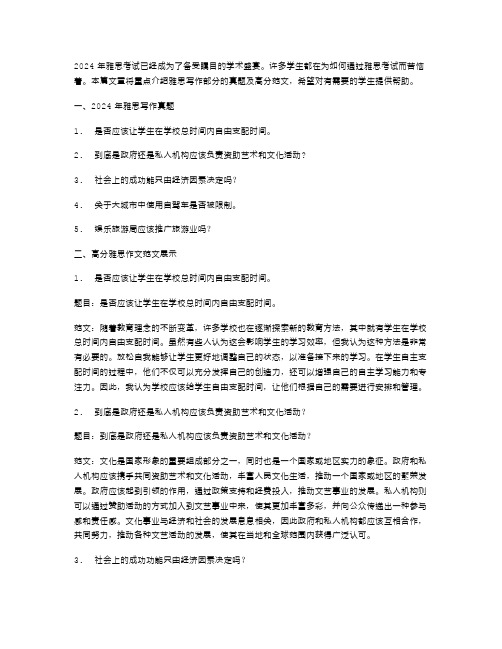
2024年雅思考试已经成为了备受瞩目的学术盛宴。
许多学生都在为如何通过雅思考试而苦恼着。
本篇文章将重点介绍雅思写作部分的真题及高分范文,希望对有需要的学生提供帮助。
一、2024年雅思写作真题1.是否应该让学生在学校总时间内自由支配时间。
2.到底是政府还是私人机构应该负责资助艺术和文化活动?3.社会上的成功能只由经济因素决定吗?4.关于大城市中使用自驾车是否被限制。
5.娱乐旅游局应该推广旅游业吗?二、高分雅思作文范文展示1.是否应该让学生在学校总时间内自由支配时间。
题目:是否应该让学生在学校总时间内自由支配时间。
范文:随着教育理念的不断变革,许多学校也在逐渐探索新的教育方法,其中就有学生在学校总时间内自由支配时间。
虽然有些人认为这会影响学生的学习效率,但我认为这种方法是非常有必要的。
放松自我能够让学生更好地调整自己的状态,以准备接下来的学习。
在学生自主支配时间的过程中,他们不仅可以充分发挥自己的创造力,还可以增强自己的自主学习能力和专注力。
因此,我认为学校应该给学生自由支配时间,让他们根据自己的需要进行安排和管理。
2.到底是政府还是私人机构应该负责资助艺术和文化活动?题目:到底是政府还是私人机构应该负责资助艺术和文化活动?范文:文化是国家形象的重要组成部分之一,同时也是一个国家或地区实力的象征。
政府和私人机构应该携手共同资助艺术和文化活动,丰富人民文化生活,推动一个国家或地区的繁荣发展。
政府应该起到引领的作用,通过政策支持和经费投入,推动文艺事业的发展。
私人机构则可以通过赞助活动的方式加入到文艺事业中来,使其更加丰富多彩,并向公众传递出一种参与感和责任感。
文化事业与经济和社会的发展息息相关,因此政府和私人机构都应该互相合作,共同努力,推动各种文艺活动的发展,使其在当地和全球范围内获得广泛认可。
3.社会上的成功功能只由经济因素决定吗?题目:社会上的成功功能只由经济因素决定吗?范文:从不同的角度来看,对于这个问题会得到不同的答案。
旅游是保护文化的唯一途径英语作文
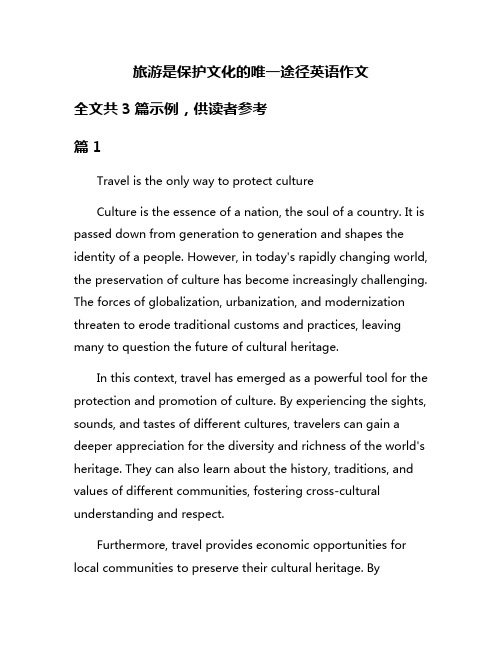
旅游是保护文化的唯一途径英语作文全文共3篇示例,供读者参考篇1Travel is the only way to protect cultureCulture is the essence of a nation, the soul of a country. It is passed down from generation to generation and shapes the identity of a people. However, in today's rapidly changing world, the preservation of culture has become increasingly challenging. The forces of globalization, urbanization, and modernization threaten to erode traditional customs and practices, leaving many to question the future of cultural heritage.In this context, travel has emerged as a powerful tool for the protection and promotion of culture. By experiencing the sights, sounds, and tastes of different cultures, travelers can gain a deeper appreciation for the diversity and richness of the world's heritage. They can also learn about the history, traditions, and values of different communities, fostering cross-cultural understanding and respect.Furthermore, travel provides economic opportunities for local communities to preserve their cultural heritage. Byattracting tourists, cultural sites and practices can be maintained and even restored, ensuring their survival for future generations. Tourists can contribute to the preservation of cultural heritage through their support of local businesses, artisans, and cultural events. In this way, travel becomes a means of empowering communities to protect and promote their culture.Moreover, travel can serve as a catalyst for cultural exchange and dialogue. When people from different backgrounds come together, they have the opportunity to share their stories, traditions, and beliefs. This exchange of ideas can lead to greater appreciation and respect for the diversity of human experience, fostering a sense of unity and solidarity among people of different cultures.In conclusion, travel is indeed the only way to protect culture in our increasingly interconnected world. By experiencing and supporting different cultures, travelers can help preserve and promote the diverse heritage of humanity. Through travel, we can bridge divides, celebrate diversity, and ensure the survival of our shared cultural legacy for generations to come. Let us embrace the power of travel as a force for cultural preservation and unity.篇2Travel is not only a way for people to relax and unwind, but also a crucial means to protect and preserve different cultures around the world. As the world becomes increasingly interconnected, the need to safeguard cultural heritage has never been more important. Travel allows individuals to experience diverse traditions, customs, and belief systems, fostering appreciation and understanding for other cultures.One of the key ways in which travel protects cultural heritage is through tourism. By visiting historical sites, museums, and culturally significant landmarks, tourists contribute to the preservation of these places. The revenue generated from tourism helps fund the maintenance and restoration of cultural sites, ensuring that they can be enjoyed by future generations. Additionally, the presence of tourists can act as a form of protection against vandalism and looting, as it increases awareness and oversight of these cultural treasures.Furthermore, travel encourages cultural exchange and dialogue between people from different backgrounds. By interacting with locals, participating in traditional activities, and sampling authentic cuisine, travelers gain a deeper insight into the customs and practices of a particular culture. Thiscross-cultural exchange fosters mutual respect andunderstanding, breaking down stereotypes and prejudices that can divide societies.In addition, travel provides economic opportunities for local communities, particularly those in remote or marginalized regions. By promoting tourism to these areas, governments and organizations can create jobs, stimulate economic growth, and preserve traditional livelihoods. This sustainable development not only benefits the local population but also helps to protect and promote their unique cultural heritage.Moreover, travel can serve as a catalyst for cultural revival and revitalization. In many parts of the world, traditional crafts, music, dance, and languages are at risk of being lost due to modernization and globalization. However, through cultural tourism initiatives, these traditions can be preserved and celebrated. By showcasing their cultural heritage to visitors, communities are inspired to continue practicing and passing down these traditions to future generations.In conclusion, travel plays a vital role in protecting and preserving cultural heritage. By promoting tourism to historical sites, fostering cultural exchange, supporting local economies, and revitalizing traditional practices, travel helps to safeguard the rich diversity of cultures around the world. As travelers, wehave the power to preserve and promote cultural heritage for the benefit of all. Let us continue to explore, learn, and respect the unique traditions of our global community.篇3Travel is the Only Way to Protect CultureIntroductionAs the world becomes increasingly interconnected and globalized, the preservation of cultural heritage has become more important than ever before. In the face of globalization and modernization, many traditional cultures are facing the threat of extinction. One of the most effective ways to protect and preserve cultural heritage is through travel. Travel not only allows us to experience different cultures and traditions firsthand, but it also provides us with the opportunity to support and uphold these valuable aspects of human history.Experiencing Different CulturesOne of the greatest benefits of travel is the opportunity to immerse oneself in different cultures and traditions. By visiting new places and interacting with local people, travelers can gain a deeper understanding and appreciation of the diversity of human civilization. Whether it's exploring the ancient temples ofCambodia, participating in a traditional tea ceremony in Japan, or learning the dance of the Maasai tribe in Kenya, travel allows us to experience firsthand the richness and beauty of cultural heritage.Preserving Traditional PracticesTravel also plays a crucial role in preserving traditional practices and customs. When travelers visit remote villages and indigenous communities, they provide much-needed economic support to local artisans, craftsmen, and performers. By purchasing handmade crafts, attending cultural performances, and supporting traditional businesses, travelers help to ensure the survival of these age-old traditions. In this way, travel not only provides a platform for cultural exchange but also contributes to the economic sustainability of local communities.Promoting Cultural AwarenessIn addition to preserving traditional practices, travel also promotes cultural awareness and understanding. Through interactions with people from different backgrounds, travelers can challenge their preconceived notions and stereotypes, and develop a more nuanced appreciation of cultural diversity. By engaging with local communities in a respectful and responsiblemanner, travelers can foster mutual respect and understanding, and contribute to the preservation of cultural heritage.Supporting Conservation EffortsTravel also has the potential to support conservation efforts and protect cultural sites from destruction and degradation. Many cultural heritage sites are facing threats from over-tourism, pollution, and development. By visiting these sites responsibly and advocating for their preservation, travelers can help to ensure that these important landmarks are protected for future generations to enjoy. In this way, travel can be a powerful tool for raising awareness about the importance of cultural heritage conservation and mobilizing support for conservation initiatives.ConclusionIn conclusion, travel is the only way to protect culture. By experiencing different cultures, preserving traditional practices, promoting cultural awareness, and supporting conservation efforts, travelers can play a critical role in safeguarding our shared human heritage. As we continue to travel the world and explore new destinations, let us do so with a deep appreciation for the cultural diversity that makes our world so unique and beautiful. By preserving and celebrating our cultural heritage, wecan ensure that future generations will be able to enjoy and learn from the rich tapestry of human civilization.。
《旅游与文化保护》高中生英语作文

《旅游与文化保护》高中生英语作文Title: The Intersection of Tourism and Cultural ProtectionTourism and cultural protection are two concepts that often come into conflict with each other.On one hand, tourism can provide economic benefits to local communities and promote cultural exchange.On the other hand, it can also lead to the commodification and degradation of cultural heritage.In this essay, I will discuss the relationship between tourism and cultural protection and argue that there is a way to balance the two.Tourism can have a positive impact on cultural protection by bringing attention and resources to neglected or endangered cultural sites.When a place becomes popular among tourists, it often becomes more important to local and national governments, who may be more willing to invest in its preservation.Furthermore, tourism can create a sense of pride and identity among local populations, leading to a greater appreciation for their own cultural heritage and a desire to protect it.However, tourism can also have negative consequences for cultural protection.The influx of tourists can lead to overcrowding, pollution, and the destruction of cultural sites.In some cases, cultural sites are deliberately altered or reconstructed to cater to tourist tastes, leading to a loss of authenticity.Moreover, the economic benefits of tourism can sometimes be concentrated in the hands of a few, leading to social andeconomic inequality.To address these challenges, it is important to find ways to balance tourism and cultural protection.One approach is to implement sustainable tourism practices, such as limiting the number of visitors to sensitive sites, promoting eco-friendly accommodations, and encouraging tourists to respect local customs and traditions.Another approach is to involve local communities in the management and preservation of cultural sites, ensuring that they benefit directly from tourism and have a say in how their cultural heritage is presented and protected.In conclusion, tourism and cultural protection are not mutually exclusive.By implementing sustainable practices and involving local communities, it is possible to harness the benefits of tourism while also preserving and protecting cultural heritage.As travelers, it is our responsibility to be aware of the impact of our actions and to support initiatives that promote cultural conservation.Together, we can ensure that future generations have the opportunity to experience and appreciate the richness and diversity of the world's cultures.。
旅游业对文化有很大的负面影响,你同意还是不同意 雅思作文
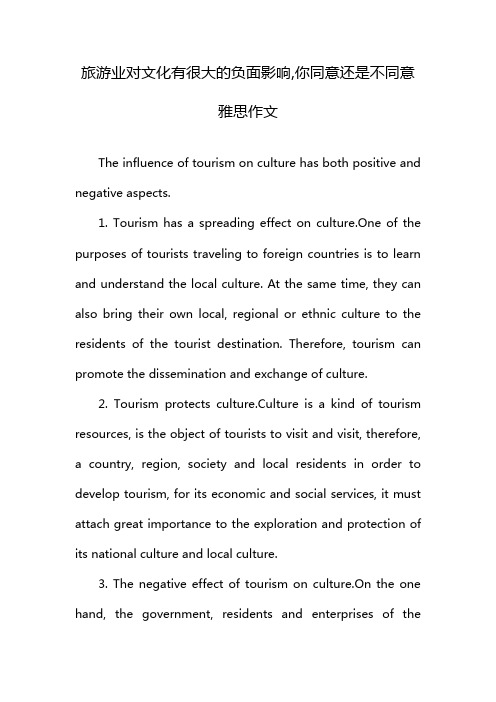
旅游业对文化有很大的负面影响,你同意还是不同意雅思作文The influence of tourism on culture has both positive and negative aspects.1. Tourism has a spreading effect on culture.One of the purposes of tourists traveling to foreign countries is to learn and understand the local culture. At the same time, they can also bring their own local, regional or ethnic culture to the residents of the tourist destination. Therefore, tourism can promote the dissemination and exchange of culture.2. Tourism protects culture.Culture is a kind of tourism resources, is the object of tourists to visit and visit, therefore, a country, region, society and local residents in order to develop tourism, for its economic and social services, it must attach great importance to the exploration and protection of its national culture and local culture.3. The negative effect of tourism on culture.On the one hand, the government, residents and enterprises of thetourism destinations will strengthen the uniqueness of the local culture to attract foreign and foreign tourists with different cultural backgrounds.So that the characteristics of the local culture is more strong, more prominent characteristics.But on the other hand, tourists will bring in their own culture or national culture, which will have an impact on the traditional culture of the tourist destination, and thus, their own national culture is gradually assimilated by foreign cultures.。
雅思作文 旅游业对文化有很大的负面影响,你同意还是不同意
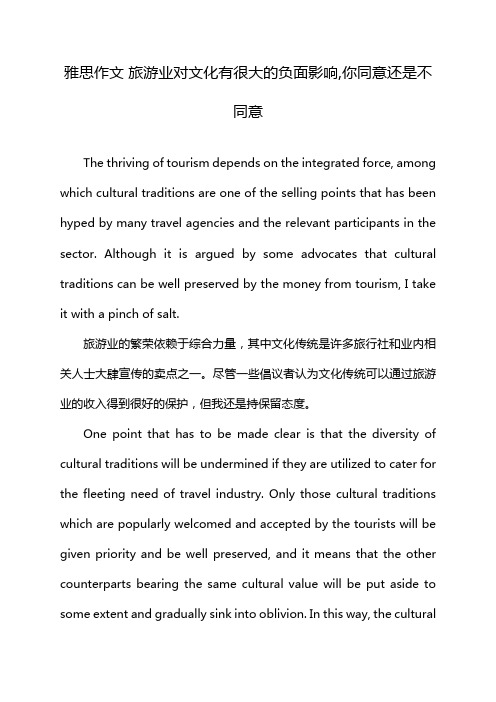
雅思作文旅游业对文化有很大的负面影响,你同意还是不同意The thriving of tourism depends on the integrated force, among which cultural traditions are one of the selling points that has been hyped by many travel agencies and the relevant participants in the sector. Although it is argued by some advocates that cultural traditions can be well preserved by the money from tourism, I take it with a pinch of salt.旅游业的繁荣依赖于综合力量,其中文化传统是许多旅行社和业内相关人士大肆宣传的卖点之一。
尽管一些倡议者认为文化传统可以通过旅游业的收入得到很好的保护,但我还是持保留态度。
One point that has to be made clear is that the diversity of cultural traditions will be undermined if they are utilized to cater for the fleeting need of travel industry. Only those cultural traditions which are popularly welcomed and accepted by the tourists will be given priority and be well preserved, and it means that the other counterparts bearing the same cultural value will be put aside to some extent and gradually sink into oblivion. In this way, the culturaltraditions whose economic value are not so obvious are likely to be less focused on and only a fraction of cultural traditions can survive in the increasingly commercialized society.必须明确的一点是,如果利用这些文化传统来满足旅游业的短暂需求,文化传统的多样性就会被削弱。
雅思写作大作文高分范文:文化传统会因为旅游业被破坏吗
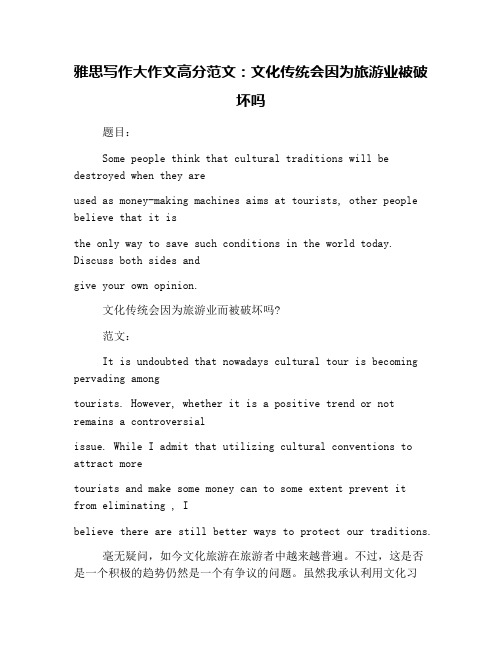
雅思写作大作文高分范文:文化传统会因为旅游业被破坏吗题目:Some people think that cultural traditions will be destroyed when they areused as money-making machines aims at tourists, other people believe that it isthe only way to save such conditions in the world today. Discuss both sides andgive your own opinion.文化传统会因为旅游业而被破坏吗?范文:It is undoubted that nowadays cultural tour is becoming pervading amongtourists. However, whether it is a positive trend or not remains a controversialissue. While I admit that utilizing cultural conventions to attract moretourists and make some money can to some extent prevent it from eliminating , Ibelieve there are still better ways to protect our traditions.毫无疑问,如今文化旅游在旅游者中越来越普遍。
不过,这是否是一个积极的趋势仍然是一个有争议的问题。
虽然我承认利用文化习俗来吸引更多的游客并赚些钱在某种水准上能够防止它的消失,但我相信仍然有更好的方法来保护我们的传统。
On the one had, we have to admit that it is a measure to attracted morepublic awareness. Since some traditions have already been neglected due to therapid development of modern society, we have to take steps to hook moreaudiences on cultural traditions. In this way, they can be known and rememberedby the public. Moreover, financial profits gained can also help to develop ormaintain a certain local convention. A good example is the Lion Dancing in China-- a conventional folk dance which has been promoted by chargeableperformances.关于这个点,我们不得不承认,这是一种吸引更多公众意识的措施。
关于旅游业的雅思作文
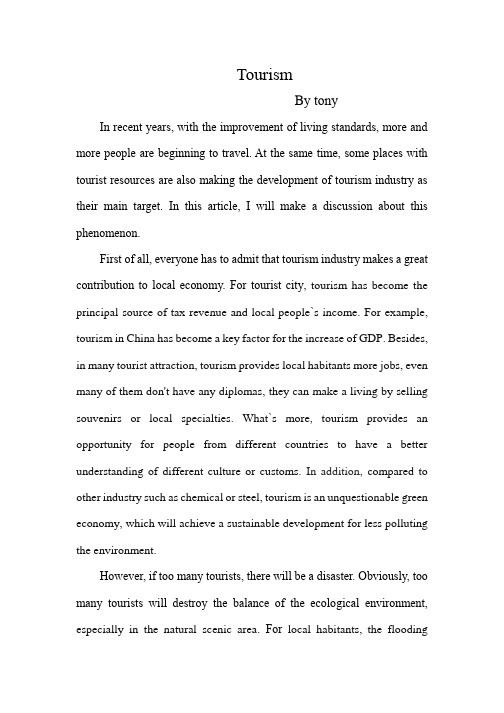
TourismBy tonyIn recent years, with the improvement of living standards, more and more people arebeginning to travel. At the same time, some places with tourist resources are also making the development of tourism industry as their main target. In this article, I will make a discussion about this phenomenon.First of all, everyone has to admit that tourism industry makes a great contribution to local economy.Fortourist city,tourism has become the principal source of tax revenue and local people`s income. For example, tourism in China has become a key factor for the increase of GDP. Besides, in many tourist attraction, tourism provides local habitantsmore jobs,even many of them don't have any diplomas, they can make a living byselling souvenirs or local specialties. What`s more, tourism provides an opportunity for people from different countries to have a better understanding of different culture or customs.In addition, compared to other industry such as chemical or steel, tourism is anunquestionable green economy, which will achieve a sustainable development for less polluting the environment.However, if too many tourists, there will be a disaster. Obviously, too many tourists will destroy the balance of the ecological environment, especially in the natural scenic area. For local habitants, the floodingtourists will disturbtheir quietlife, making local areas overcrowded.And overexploitation of tourist attraction will result in a dramatically increase in the cost of living. Last but not least, if tourists do not respect the local customs, and even make impolite comments about it, which will leadto inevitable conflictsbetweentourists and local habitants.Generally speaking, the tourism industry has more advantages than disadvantages to the city. But while enjoying the convenience it bringsus, we should pay attention to controlling the scale so as to avoid the harm caused by too many tourists.。
- 1、下载文档前请自行甄别文档内容的完整性,平台不提供额外的编辑、内容补充、找答案等附加服务。
- 2、"仅部分预览"的文档,不可在线预览部分如存在完整性等问题,可反馈申请退款(可完整预览的文档不适用该条件!)。
- 3、如文档侵犯您的权益,请联系客服反馈,我们会尽快为您处理(人工客服工作时间:9:00-18:30)。
雅思大作文范文:旅游业文化保护
本文是雅思大作文范文《旅游业文化保护》,供大家阅读参考。
认真研读一定的雅思范文及作文模板可以帮助我们检验自己的写作水平,并能很好地吸收和应用优秀范文里的优秀内容。
范文
There is little room for doubt that tourism is one of the
fastest-growing industries in the world. However, its impact on culture remains a source of constant debate. This essay will elaborate on both positive and negative effects of tourism from a cultural perspective.
Providing economic incentives for cultural preservation is unarguably one of the main contributions of tourism. To many tourists, culture and history are what they first consider when choosing a destination. Their mindset has been recognised by many tourism sites and money has been subsequently directed toward cultural protection, including the maintenance of key historical sites. Tourism is therefore one of the primary forces contributing to the preservation of a culture.
In addition to raising financing, tourism can make an indigenous culture known to the world and rally support worldwide to protect it.
When a historic site or a site that shows a country's cultural heritage is made accessible to the public, visitors from all over the world will soon flock there. They will share their experience in the local culture with their friends and families once they return home, assisting this site to gain international fame. Both financial and technological support will flood in for the conservation of natural and cultural resources.
On the negative side, tourism develops sometimes at the expense of part of culture. Food, festivals, costumes and other stimulating elements of a culture are highlighted to entertain tourists, constituting an insult to the locals and causing damage to the unique nature of a culture. Moreover, cultural commercialization has made the sacred elements of a culture commonplace and tourists are encouraged to attach little importance to a unique tradition, which cannot be found elsewhere.
In the light of these facts, one can conclude that tourism is neither a boon nor a bane to cultural preservation. While its endeavour lo protect an indigenous culture should be recognized, it has put the integrity of a culture at risk.。
